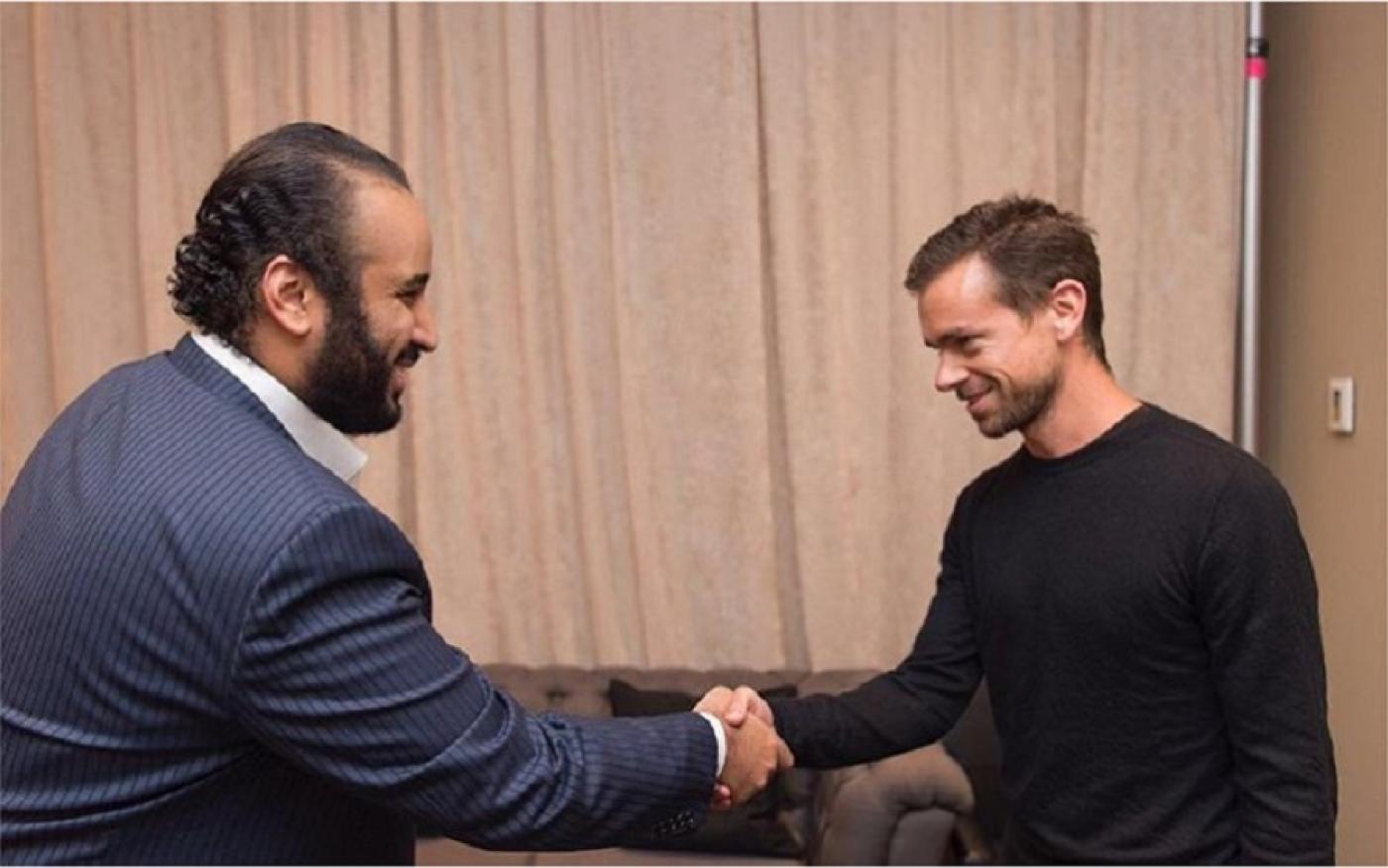Twitter CEO Jack Dorsey met with Mohammed bin Salman six months after the social media giant learned that a spy, directed by the Saudi leader’s close associate, had infiltrated the company.
Since becoming de facto leader of the kingdom in 2017, the crown prince has waged a harsh crackdown on human rights activists and dissidents, much of which has been played out online.
'It’s hard to imagine that [Dorsey] wouldn’t have heard about it six months later'
- Mark Kleiman, lawyer for Omar Abdulaziz
Lawyers for one of the Saudi dissidents targeted in the operation say Dorsey and Mohammed bin Salman's meeting raises questions about what the CEO of Twitter, a company which has seen massive Saudi investment in recent years, knew and when he knew it.
In December 2015, according to a complaint filed in a US district court in California last month, Twitter discovered that one of its engineers, a Saudi citizen named Ali Alzabarah, had been accessing the personal data of users.
A week later, the company warned several dozen users that their accounts were among a small group that “may have been targeted by state-sponsored actors."
Yet in June 2016, Dorsey sat down with the then-deputy crown prince, reportedly discussing how the two could cooperate to “train and qualify Saudi cadres” and chatting about technology investments.
Their chat in New York City was documented in photos posted on social media by Bader al-Asaker, head of Mohammed bin Salman’s private office and the man believed to be the Saudi official alleged in court records to have overseen the data-collection operation inside Twitter.
As it turns out, according to details revealed in a second legal complaint filed by the US government this week, it wasn’t just a small group of users whose information Alzabarah had accessed - and he wasn’t alone.
"The thing that strikes me is when you look through the government’s complaint, this guy hacked 5,500 records in June. That’s not a small number. It raises the question about what Twitter did and did not want to know,” said Mark Kleiman, an attorney who represents Omar Abdulaziz, a Saudi dissident living in Canada.
Kleiman told Middle East Eye that he and Ben Gharagozli, a second lawyer representing Abdulaziz, understood that “somebody from one of the three-letter agencies in the US” tipped Twitter off about Azabarah, before company put him on administrative leave in early December 2015.
"It’s hard to imagine that [Dorsey] wouldn’t have heard about it six months later,” he said.
Marc Owen Jones, a social media analyst and assistant professor at Hamad bin Khalifa University in Qatar, said it was “highly unlikely” that Dorsey wasn’t aware that a US intelligence agency had warned his company that state-sponsored actors had infiltrated Twitter.
"The severity of the charge and the need for discussions around security and privacy at a high level would certainly have made it a top item on any agenda,” Jones told MEE.
“Indeed, if Dorsey was not made aware of the issue, then Twitter’s competence as a tech company should be brought further into question".
MEE sent Twitter a list of questions including:
• When and how Twitter became aware of Alzabarah’s activities
• Whether Twitter believed its accounts had been targeted by a state-sponsored actor in December 2015
• Whether Twitter was aware in December 2015 that Alzabarah had been feeding user data to Bader al-Asaker, who had close ties to the Saudi ruling family
• Whether Dorsey had been made aware of Alzabarah’s activities and the fact that he had been involved in state-sponsored activity and, if so, whether he knew about these actions when he met with Mohammed bin Salman in June 2016
• Whether Dorsey raised any concerns over the incident with Mohammed bin Salman or Asaker during the June 2016 meeting
Twitter declined to answer any of the questions specifically, sending a general statement from a spokesperson thanking the FBI and the US Department of Justice for their support with the investigation.
"Our company limits access to sensitive account information to a limited group of trained and vetted employees. We understand the incredible risks faced by many who use Twitter to share their perspectives with the world and to hold those in power accountable," the statement said.
"We have tools in place to protect their privacy and their ability to do their vital work. We’re committed to protecting those who use our service to advocate for equality, individual freedoms, and human rights."
The company’s “blanket, one-size-fits all” response speaks volumes, said Gharagozli, one of Abdulaziz’s lawyers.
“If Twitter were confident in its position, it would have taken this opportunity to assure the public and their users that they are complying with legal and ethical guidelines,” he said.
'One more Silicon Valley mishap'
According to a complaint filed by the US government this week, which accuses Alzabarah and two others of spying on behalf of Saudi Arabia, the engineer accessed the data of more than 6,000 accounts during a seven-month spree before Twitter put him on administrative leave.
He regularly shared information with Ahmed al-Mutairi, a Saudi social media marketer also known as Ahmed al-Jbreen and named in the complaint. Mutairi’s company, according to the filing, has done work for the Saudi royal family and he appears to have close ties with the crown prince.
After Alzabarah was put on administrative leave by Twitter, he moved back to Saudi Arabia and become the CEO of the MiSK Foundation, a non-profit organisation chaired by Asaker which says it develops and encourages young leaders in the kingdom.
Earlier in 2015, a second Twitter employee accused of spying, Ahmad Abouammo, is alleged to have shared the data of two users - one who is thought to be the anonymous Twitter user Mujtahidd and a second who was impersonating a member of the Saudi royal family - in exchange for a $20,000 gold watch and $300,000, according to the complaint.
Data allegedly shared included passwords, birthdays and IP addresses that could be used to figure out that location and identity of anonymous users.
A separate complaint filed in the same California court on 18 October on behalf of Abdulaziz accuses the social media company of invading his privacy and exposing his family member, friends and political associates to imprisonment, torture and death.
Abdulaziz was a close associate of Jamal Khashoggi, the journalist murdered by Saudi agents in Istanbul last year. He has previously told MEE that he believes the same thing could have easily happened to him.
Last year, he said, two Saudi agents came to Montreal, where he has lived for a decade. They said they were working for Saud al-Qahtani, one of the crown prince’s top advisers, and tried to convince Abdulaziz to return to the kingdom.
When he refused their offer, he said they tried to get him to visit the Saudi embassy in Ottawa to pick up a new passport instead. He never went.
According to the 18 October complaint, also levelled against consultant McKinsey & Company, who identified Abdulaziz to Saudi officials as one of the top voices shaping public opinion, he was not among the group of users who was alerted in December 2015 about Twitter’s concerns over potential state-sponsored activities.
Instead, Abdulaziz was sent a message in February 2016 that a bug that had been fixed that had affected Twitter’s password recovery systems for 24 hours a week earlier.
"In our investigation, we discovered that the email address and phone number linked to your account was viewed by another account and we wanted to alert you as soon as possible,” the message said.
"It wasn’t just Omar,” said Kleiman. “They left all of these people defenceless, thinking it was just one more Silicon Valley mishap without realising that somebody put a laser dot on their heads. These people have been targeted".
The complaint also highlights Saudi investments made in the social media company in recent years, including significant holdings by Prince Al-Waleed bin Talal.
In October 2015, two months before Twitter put Alzabarah on administrative leave, the prince’s Kingdom Holding Company reportedly doubled its stake in the social media company, raising his overall stake to over 5 percent of the company. The complaint holds that his stake then became larger than that held by Dorsey.
However, said Kleiman, the relationship is a two-way street.
"It’s not just that the Saudis are heavily invested in Twitter. Twitter is heavily invested in the region from a viewing perspective. Twitter benefits enormously from the number of people who use and rely on it in Saudi Arabia, Egypt, the UAE, etc. So I think the interest in mutual,” Kleiman said.
Gharagozli added: "Instead of protecting their users, it appears as though they seem to have allowed the Kingdom of Saudi Arabia, which owns a substantial percentage of Twitter, to get access to data that resulted in many people getting hurt."
Source: Middle East Eye



























